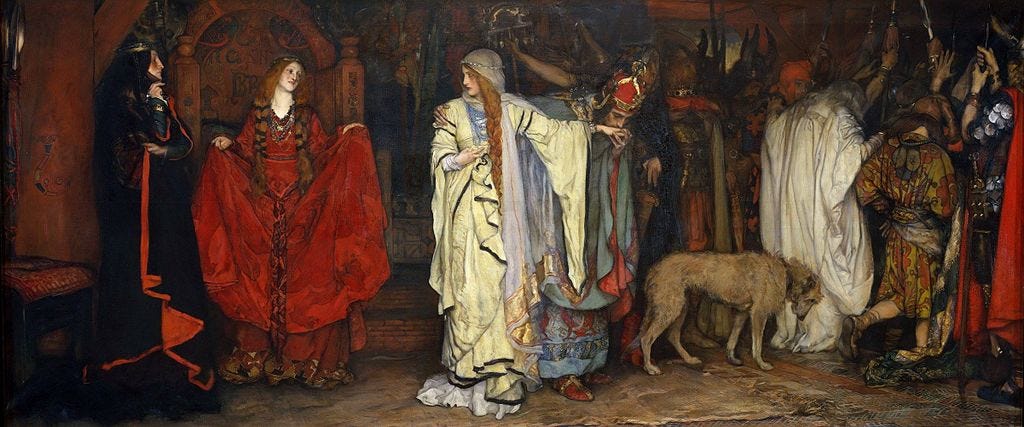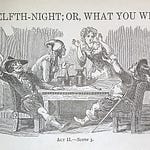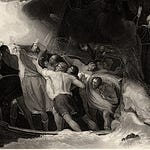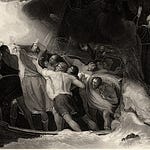In celebration of the two-year anniversary of Word & Song on the Fourth of July, we are offering a special rate on paid, gift, and upgraded subscriptions. Stay tuned this week for more!
Here is the scene. The old King Lear, a naturally hasty and temperamental man, has done the most foolish thing in his life. He has divided up his kingdom, giving half each to his two elder daughters. He had wanted to divide it into three, with each daughter competing, in public, to win the choicest third, and he’d expected that his youngest daughter, Cordelia, who really does love him best, would play along with his game and flatter him the most. But when he asked her what she had to say, she replied, “Nothing, my lord.”
“Nothing?” says the old man, not believing his ears. “Nothing will come of nothing. Speak again.” But she does not flatter. She says that she loves him and honors him and obeys him as a daughter should, but she will not pretend that when she marries — because this day is to mark her betrothal, too — she will love her father more than she loves her husband. “Why have my sisters husbands?” she asks, because they’ve just been insisting that they love their father more than anything in the universe, more than light and life. “Sure I shall never marry like my sisters, / To love my father all.” Well, you don’t show up a king when he’s arranged everything to please his ego. Lear pitches himself into a rage, banishes Cordelia from the kingdom, and chops up her portion to give to the lying flatterers, Goneril and Regan.
That sets up the passage that is our Poem of the Week. As soon as Cordelia is out of the way, Goneril and Regan conspire to treat their father badly, insisting that he shed himself of his loyal entourage, and essentially be their ward, like an old baby who can’t take care of himself anymore. Lear leaves Goneril’s house, sure that Regan will treat him more honorably, but Regan gives him a stiff arm. Why should he have a hundred knights for retainers? Why should he have fifty or twenty five? “What need one?” says Regan.
Now, we have watched as the old king has struggled between one disappointment and another, between hearing the truth of what he has done and not wanting to hear it, between his natural anger and our Word of the Week, patience, and the strife in his heart would be great for any man to endure, but for an old man who has gotten his way all his life, an old man whom we see losing his physical strength as the play goes on, it is like to tear him in two. So he says he needs patience. And again, that word has a force we no longer associate with it. It suggests the virtue of endurance, especially when the Lord — whom the pagan Lear does not know — is sending us trials to turn our souls about and to give us a strength we could never have imagined we might have.
There’s another thing about patience I should mention here. Lear is going to be compelled by circumstances and by his own mental confusion to take some notice of people who suffer, especially of the poor. Perhaps only suffering can do that to a rich and powerful man, a suffering that will reduce him to an old man in a tattered cloak, standing bare-headed on the heath in the middle of a thunderstorm. But as he descends, he becomes more kingly. We see that transformation at its onset in the passage below.
GONERIL. Hear me, my lord. What need you five-and-twenty? ten? or five? To follow in a house where twice so many Have a command to ten you? REGAN. What need one? LEAR. O reason not the need! Our basest beggars Are in the poorest thing superfluous. Allow not nature more than nature needs, Man's life is cheap as beast's. Thou art a lady: If only to go warm were gorgeous, Why, nature needs not what thou gorgeous wear'st, Which scarcely keeps thee warm. But, for true need -- You heavens, give me that patience, patience I need. You see me here, you gods, a poor old man, As full of grief as age, wretched in both. If it be you that stirs these daughters' hearts Against their father, fool me not so much To bear it tamely; touch me with noble anger, And let not women's weapons, water drops, Stain my man's cheeks. No, you unnatural hags! I will have such revenges on you both That all the world shall -- I will do such things -- What they are, yet I know not, but they shall be The terrors of the earth. You think I'll weep. No, I'll not weep. Storm and tempest. I have full cause of weeping, but this heart Shall break into a hundred thousand flaws Or ere I'll weep. O Fool, I shall go mad!
Listen to this episode with a 7-day free trial
Subscribe to Word & Song by Anthony Esolen to listen to this post and get 7 days of free access to the full post archives.













